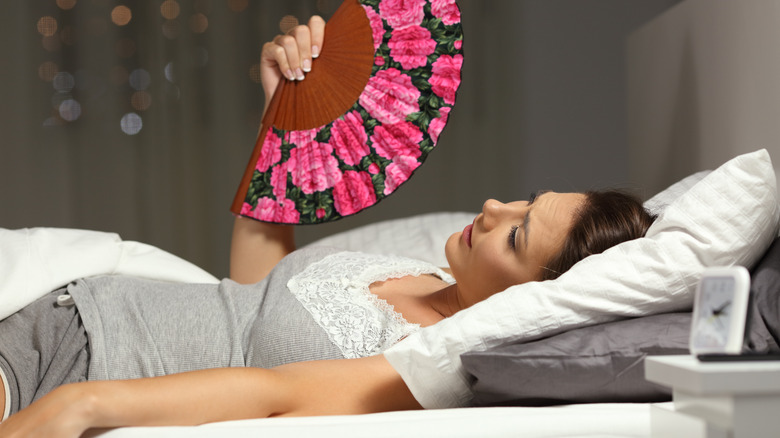Signs You Might Have Early Onset Menopause
It's commonly known that menopause usually occurs during midlife and is officially diagnosed when there have been 12 consecutive months without a period. Menopause typically happens between 45 and 55 years of age, with the average age being 51. Yet, for some, menopause comes earlier.
Believe it or not, menopause can occur in young adulthood in the 20s and 30s. Though it happens, undergoing menopause in the 20s is considered rare. Anytime menopause occurs before the age of 40, it's regarded as premature menopause. One to two percent of people assigned female at birth experience premature menopause.
Early onset menopause is slightly different. While it happens closer to the age of typical menopause, it still occurs a little too soon, between 40 and 45 (via Everyday Health). "Experiencing menopause at 40 to 45 years of age is called early menopause, and that occurs in about 5 to 7 percent of the population," explains Dr. Stephanie S. Faubion.
These symptoms are common with early-onset menopause
Since menopause is only diagnosed once you have reached 12 full, consecutive months without a period, you can experience symptoms for years before that as your hormones change. Many symptoms common during the years leading up to natural menopause also occur with early onset menopause.
As per Cleveland Clinic, one of the first things you may notice is that your periods change. They may be lighter or heavier, less frequent, and you may skip a month here and there. Your cycles may become shorter or longer, and you may experience random spotting, and they no longer follow their regular pattern.
Other signs of early onset menopause include night sweats, hot flashes, rapid heart rate, muscle and joint pains, headaches, and breast tenderness. You may also notice emotional disturbances such as depression, irritability, and anxiety. At the same time, you may experience an inability to fall and stay asleep. As a result, you may end up feeling continually exhausted.
PMS symptoms can be similar to menopause symptoms
Many of the signs of early-onset menopause can be quite similar to premenstrual syndrome, or PMS (via WebMD). You may have had irritability, anxiety, headaches, and breast tenderness during PMS for many years, but there are a few ways to tell if the symptoms stem from PMS. The most significant difference is that PMS symptoms will end once your period comes, but menopause symptoms can happen at any time of the month and be ongoing.
Another thing to consider is that if you have symptoms you've never had before, it's worth mentioning to your healthcare provider. That is especially true if they are interfering with your daily routine or causing you physical or emotional discomfort. Many different things can occur with hormone health that may or may not be early onset menopause.
The only way to get a proper diagnosis is to see a gynecologist and have bloodwork done. If you have signs of early onset menopause, seek a doctor skilled in hormone health and menopause.


